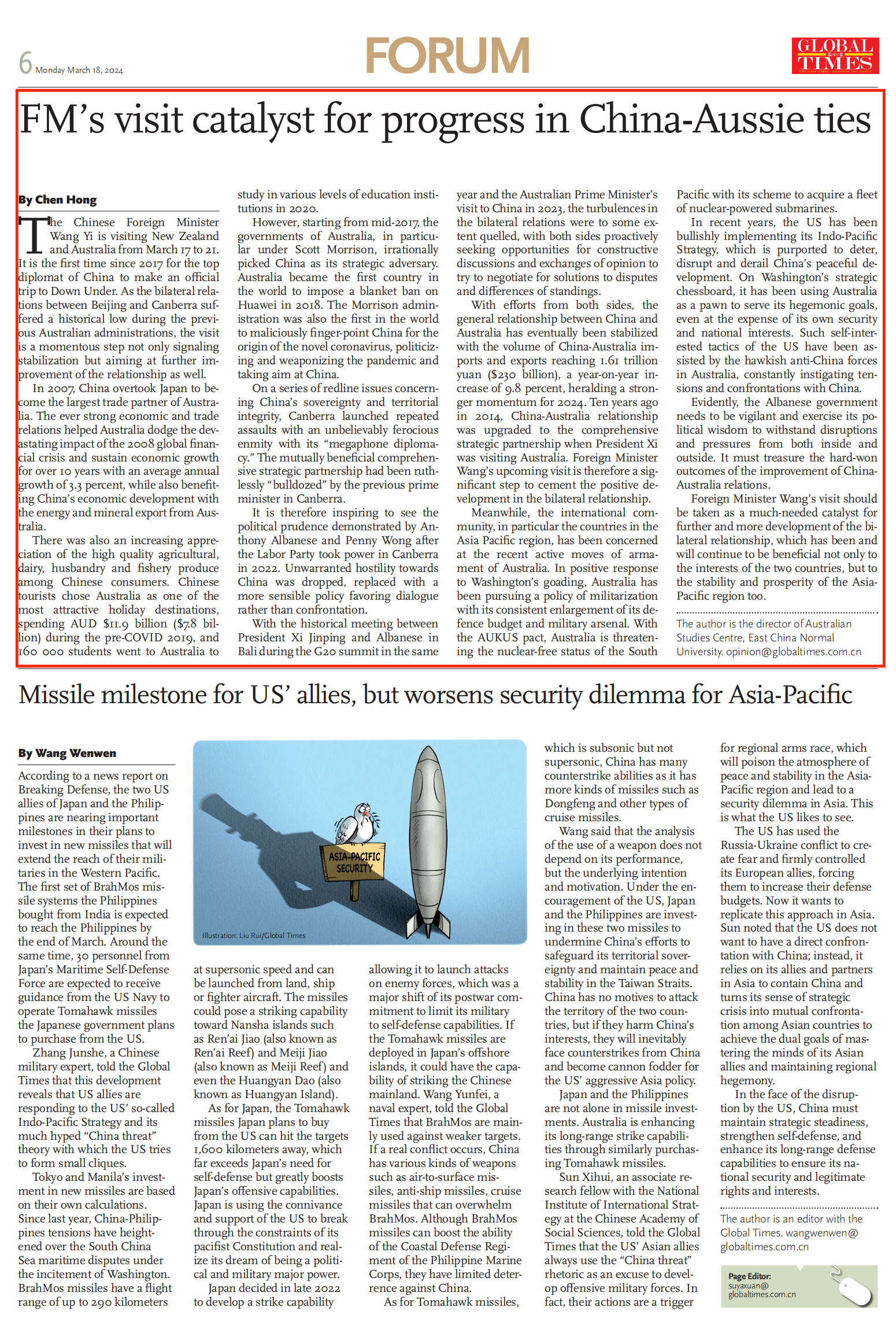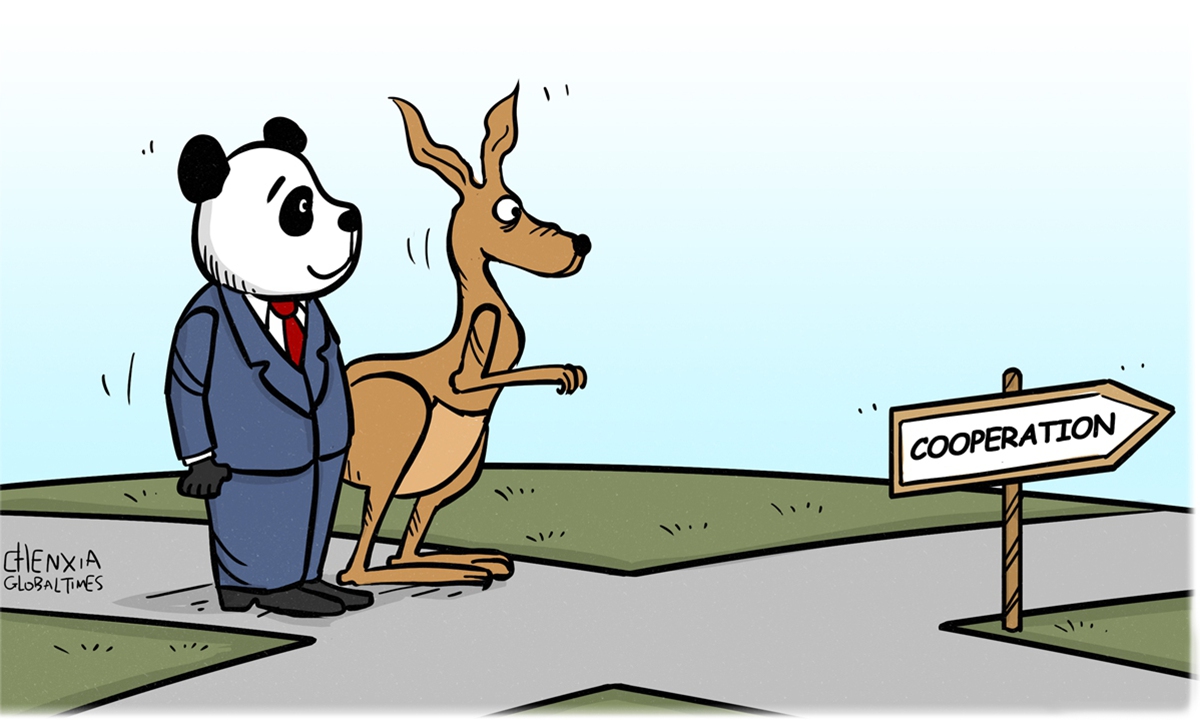2024年3月17日,华东师范大学澳大利亚研究中心主任陈弘在《环球时报》英文版Global Times发表文章,谈王毅外长对新西兰、澳大利亚进行访问与中澳关系发展前景。

FM’s visit catalyst for progress in China-Aussie ties

Illustration: Chen Xia/GT
The Chinese Foreign Minister Wang Yi is visiting New Zealand and Australia from March 17 to 21. It is the first time since 2017 for the top diplomat of China to make an official trip to Down Under. As the bilateral relations between Beijing and Canberra suffered a historical low during the previous Australian administrations, the visit is a momentous step not only signaling stabilization but aiming at further improvement of the relationship as well.
In 2007, China overtook Japan to become the largest trade partner of Australia. The ever strong economic and trade relations helped Australia dodge the devastating impact of the 2008 global financial crisis and sustain economic growth for over 10 years with an average annual growth of 3.3 percent, while also benefiting China's economic development with the energy and mineral export from Australia.
There was also an increasing appreciation of the high quality agricultural, dairy, husbandry and fishery produce among Chinese consumers. Chinese tourists chose Australia as one of the most attractive holiday destinations, spending AUD $11.9 billion ($7.8 billion) during the pre-COVID 2019, and 160 000 students went to Australia to study in various levels of education institutions in 2020.
However, starting from mid-2017, the governments of Australia, in particular under Scott Morrison, irrationally picked China as its strategic adversary. Australia became the first country in the world to impose a blanket ban on Huawei in 2018. The Morrison administration was also the first in the world to maliciously finger-point China for the origin of the novel coronavirus, politicizing and weaponizing the pandemic and taking aim at China. On a series of redline issues concerning China's sovereignty and territorial integrity, Canberra launched repeated assaults with an unbelievably ferocious enmity with its "megaphone diplomacy." The mutually beneficial comprehensive strategic partnership had been ruthlessly "bulldozed" by the previous prime minister in Canberra.
It is therefore inspiring to see the political prudence demonstrated by Anthony Albanese and Penny Wong after the Labor Party took power in Canberra in 2022. Unwarranted hostility towards China was dropped, replaced with a more sensible policy favoring dialogue rather than confrontation. With the historical meeting between President Xi Jinping and Albanese in Bali during the G20 summit in the same year and the Australian Prime Minister's visit to China in 2023, the turbulences in the bilateral relations were to some extent quelled, with both sides proactively seeking opportunities for constructive discussions and exchanges of opinion to try to negotiate for solutions to disputes and differences of standings.
With efforts from both sides, the general relationship between China and Australia has eventually been stabilized with the volume of China-Australia imports and exports reaching 1.61 trillion yuan ($230 billion), a year-on-year increase of 9.8 percent, heralding a stronger momentum for 2024.
Ten years ago in 2014, China-Australia relationship was upgraded to the comprehensive strategic partnership when President Xi was visiting Australia. Foreign Minister Wang's upcoming visit is therefore a significant step to cement the positive development in the bilateral relationship.
Meanwhile, the international community, in particular the countries in the Asia Pacific region, has been concerned at the recent active moves of armament of Australia. In positive response to Washington's goading, Australia has been pursuing a policy of militarization with its consistent enlargement of its defence budget and military arsenal. With the AUKUS pact, Australia is threatening the nuclear-free status of the South Pacific with its scheme to acquire a fleet of nuclear-powered submarines.
In recent years, the US has been bullishly implementing its Indo-Pacific Strategy, which is purported to deter, disrupt and derail China's peaceful development. On Washington's strategic chessboard, it has been using Australia as a pawn to serve its hegemonic goals, even at the expense of its own security and national interests. Such self-interested tactics of the US have been assisted by the hawkish anti-China forces in Australia, constantly instigating tensions and confrontations with China.
Evidently, the Albanese government needs to be vigilant and exercise its political wisdom to withstand disruptions and pressures from both inside and outside. It must treasure the hard-won outcomes of the improvement of China-Australia relations. Foreign Minister Wang's visit should be taken as a much-needed catalyst for further and more development of the bilateral relationship, which has been and will continue to be beneficial not only to the interests of the two countries, but to the stability and prosperity of the Asia-Pacific region too.
The author is the director of Australian Studies Centre, East China Normal University.opinion@globaltimes.com.cn